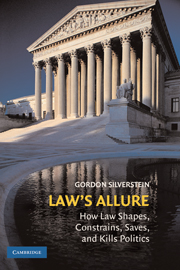Book contents
- Frontmatter
- Contents
- Acknowledgments
- LAW'S ALLURE
- Introduction: Law's Allure: The Juridification of American Politics and Public Policy
- PART I LAW'S ALLURE: WHY, WHY NOW, AND WHY IT MATTERS
- PART II LAW'S ALLURE: PATTERNS, PROCESS, AND CAUTIONARY TALES
- PART III LAW'S ALLURE: COSTS AND CONSEQUENCES
- Conclusion: The Promise and Peril of Law's Allure
- Bibliography
- Index
- References
Introduction: Law's Allure: The Juridification of American Politics and Public Policy
Published online by Cambridge University Press: 05 June 2012
- Frontmatter
- Contents
- Acknowledgments
- LAW'S ALLURE
- Introduction: Law's Allure: The Juridification of American Politics and Public Policy
- PART I LAW'S ALLURE: WHY, WHY NOW, AND WHY IT MATTERS
- PART II LAW'S ALLURE: PATTERNS, PROCESS, AND CAUTIONARY TALES
- PART III LAW'S ALLURE: COSTS AND CONSEQUENCES
- Conclusion: The Promise and Peril of Law's Allure
- Bibliography
- Index
- References
Summary
The members of the u.s. senate assembled what they like to call the “world's greatest deliberative body” on a crisp November evening a few years ago for a debate that would last more than forty hours. This great gathering was not about public health or civil rights; it was not about individual liberty, or property, or prosperity. It did not focus on war or peace. Instead, these orators had assembled to filibuster against the filibusters that were blocking the confirmation of presidential nominees to serve as federal judges.
This effort was seen by many as a practice run for the struggle that would ensue when Supreme Court Justice Sandra Day O'Connor announced her retirement, an event triggering carefully rehearsed plans that “would rival a presidential campaign, complete with extensive television advertising, mass e-mails, special Internet sites, opposition research, public rallies and news conferences.” President George W. Bush's supporters pledged more than $18 million for the effort, and Democrats tapped into their own war chests, using veterans of the Clinton and Gore campaigns to mount an all-out battle.
Judicial and political power are inextricably linked in America, but by the time John Roberts and Samuel Alito joined the Supreme Court, that link seemed more significant and more pervasive than ever before. Efforts to regulate and even eliminate tobacco, to reform the criminal justice system, to protect privacy, and save the environment; efforts to define and defend a woman's right to choose an abortion; efforts to integrate schools and reform prison systems; efforts to control and automate the federal budget, to define and limit the exercise of war powers, and contain and prosecute federal corruption – in each of these and more, the answer increasingly was a legalistic one: politicians and policy entrepreneurs turning to the courts and the adjudicative process as a substitute for the persuasion, negotiation, bargaining, and tradeoffs of political decision making.
- Type
- Chapter
- Information
- Law's AllureHow Law Shapes, Constrains, Saves, and Kills Politics, pp. 1 - 12Publisher: Cambridge University PressPrint publication year: 2009



